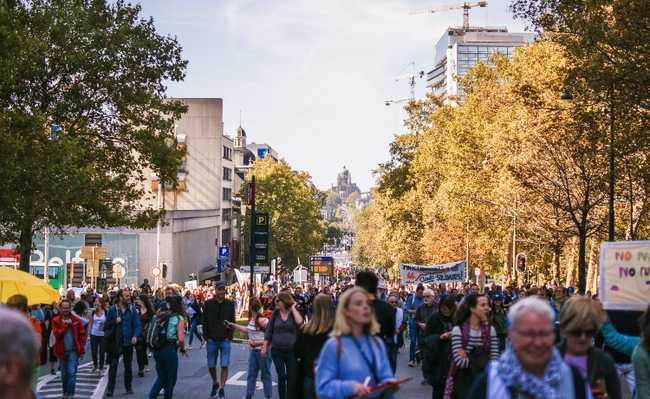Citizenship: what it is and how to exercise it
Citizenship establishes an individual's status of belonging to a politically articulated community

Image: Pauline Loroy in Unsplash
The term “citizenship” has an etymological origin in Latin civitas, which means “city”. Citizenship can be defined as the condition of access to civil, political and social rights that allow citizens to develop their full potential, including participating in an active, organized and conscious way in collective life in the State. In the field of civil rights, an example is the freedom of expression and thought of. With regard to political rights, citizenship guarantees the participation of individuals in the exercise of political power. Finally, social rights are related to economic and social well-being, such as access to health and education.
In Brazil, the legal achievement of these rights has not been able to hide practical problems faced by a large part of the population. From this perspective, many individuals are unable to fully exercise their citizenship, as they do not have access to basic rights such as education, health, housing and basic sanitation.
Throughout human history, the concept of citizenship has been understood in different ways. Its origin dates back to ancient Greece, with the development of the Greek Polis, in the city-state of Athens, where only free men over 21 years old who were Athenians and children of Athenian parents were considered citizens. In Rome, citizenship was granted only to free men. In democratic societies, the current concept of citizenship tends to be more comprehensive and is inserted in the context of the emergence of Modernity and the structuring of Nation-States, mainly inspired by the ideals of the French Revolution of 1779.
Although influenced by older conceptions, modern citizenship has its own character and is divided into two categories: formal and substantive. Formal citizenship refers to the indicative of nationality, of belonging to a nation-state, as in the case of a person holding Brazilian citizenship. Substantive citizenship, in turn, is defined as the possession of civil, political and social rights.
Thomas Marshall's classic study - "Citizenship and Social Class" - which describes the extension of civil, political and social rights to the entire population of a nation, enabled the compression of substantive citizenship from the 20th century onwards. These rights were established with the creation of the Welfare State in the United States (welfare state), at the end of World War II. In general, social movements and the effective participation of citizens were fundamental for a gradual and significant expansion of political, social and civil rights in society.
By constantly renewing itself in the face of social transformations, historical contexts and especially changes in ideological paradigms, the concept of citizenship is dynamic and constantly evolving. For the conquered rights to become part of reality, a lot of struggle and awareness on the part of the population is necessary. One example is women's suffrage, guaranteed in 1932 by the first Brazilian Electoral Code. This achievement was only possible thanks to the pressure and organization of various feminist movements at the beginning of the 20th century.
In Western countries, modern citizenship was constituted in stages. According to Marshall, a society only contemplates full citizenship when it articulates three rights. Are they:
- Civil: rights inherent to individual freedom, freedom of expression and thought; right of ownership and conclusion of contracts; and right to justice;
- Political: right to participate in the exercise of political power, as an elected or voter, in the set of public authority institutions;
- Social: set of rights related to economic and social well-being, ranging from security to the right to share a better standard of living, according to prevailing standards in society.
How to exercise citizenship and be a conscientious citizen?
Citizenship establishes the equality of individuals before the law and guarantees the possibilities for every citizen to exercise the set of political, civil and social rights of their country, being subject to duties imposed on them. It is, therefore, related to the conscious and responsible participation of individuals in society, ensuring laws that ensure that their rights are not violated.
Citizenship and sustainable consumption are closely linked. According to the Ministry of the Environment, sustainable consumption involves the choice of products that use less natural resources in their production, which ensured decent employment for those who produced them and which will be easily reused or recycled. Thus, sustainable consumption happens when our choices are conscious, responsible and made with the understanding that they will have environmental and social consequences.
citizenship in Brazil
The citizenship process, in general, begins with the acquisition of civil rights, according to historian José Murilo de Carvalho. Individuals in possession of their civil rights are free to think, act and express their opinions and choices. As a result, he begins to exercise his political rights and participate in decisions that impact his life and society. Political participation, in turn, makes it possible to claim social rights in order to improve the population's quality of life.
In Brazil, however, the trajectory of rights followed an inverse logic, according to the researcher in his book “Citizenship in Brazil: the long way”. “First came social rights, implemented during a period of suppression of political rights and the reduction of civil rights by a dictator who became popular. Then came political rights, in a bizarre way too. The greatest expansion of the right to vote took place in another dictatorial period, in which the organs of political representation were transformed into a decorative piece of the regime. Finally, even today many civil rights remain inaccessible to the majority of the population,” he says.
Carvalho explains that at many times there was an emphasis on social rights, to make up for the lack of other rights, that is, there was manipulation of public resources to promote social rights such as housing, transport, health, education, social security and work. This was a strategy used to silence the population and, especially, groups that could demonstrate against the reduction of civil and political rights.
What the text makes clear is that there is still a lot to be done in relation to the full exercise of citizenship in Brazil. The achievement of civil, political and social rights has not been able to hide central problems faced by a large part of the population, such as unemployment, illiteracy, urban violence and the precariousness of sanitation, health and education services.
Conclusion
In addition to continuing the struggle for equal rights, it is essential that everyone does their part and contribute to the quality of life of present and future generations. Small attitudes are important for the planet and allow your citizenship to express itself in a conscious way. For this, each individual must evaluate the set of their behaviors and the possible consequences they provoke in society and the environment, always opting for less aggressive choices.










